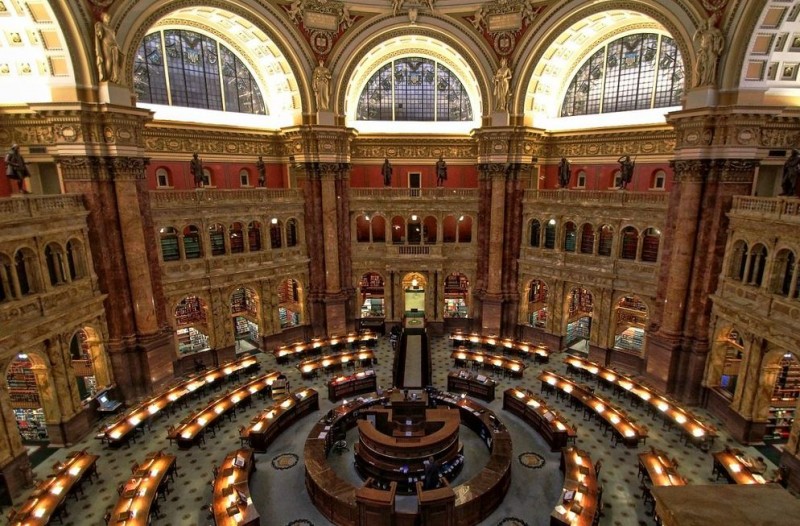
The Library of Congress, situated in Washington, D.C., stands as a testament to knowledge, history, and culture. Boasting an awe-inspiring collection of over 170 million items, this magnificent institution is a symbol of the nation's pursuit of intellectual enrichment. In this article, we will delve into the Library of Congress's rich history, explore its vast collection, and shed light on its profound impact on research, education, and American culture.
History of the Library of Congress
Establishment and Early Years
The Library of Congress had its genesis in 1800 when President John Adams signed an act of Congress to move the nation's capital from Philadelphia to Washington, D.C. Included in this act was the allocation of $5,000 for the purchase of books to start a congressional library.
Growth and Development Over Time
Over the years, the Library of Congress expanded both in size and scope. The British invasion of Washington during the War of 1812 resulted in the destruction of the original collection, but Thomas Jefferson's extensive personal library laid the groundwork for the library's revival.
Size and Scope of the Collection
Number of Items Held
Today, the Library of Congress houses over 170 million items, making it the largest library in the world. Its collection includes books, manuscripts, maps, photographs, films, sound recordings, and much more.
Types of Materials in the Collection
The library's diverse collection encompasses an astounding array of materials, from ancient scrolls to modern digital media. It contains invaluable historical documents, literary masterpieces, artistic works, and scientific publications.
The Library of Congress Classification System
How Items are Organized
The Library of Congress uses a sophisticated classification system to organize its vast collection. This system, based on subject matter, allows for efficient retrieval of materials and easy navigation for researchers and visitors.
Advantages of the Classification System
The Library of Congress Classification System has become a model for other libraries worldwide due to its effectiveness and flexibility in accommodating new subjects and disciplines.
The Library's Architecture and Iconic Features
Thomas Jefferson Building
The Thomas Jefferson Building, one of the Library's three buildings, is a stunning architectural marvel. With its neoclassical design and impressive interior adorned with intricate artwork, it reflects the grandeur of knowledge and culture.
Other Notable Buildings and Features
Apart from the Thomas Jefferson Building, the Library of Congress complex includes the John Adams Building and the James Madison Memorial Building, each with its unique architectural significance.
Key Departments and Divisions within the Library
Manuscript Division
The Manuscript Division houses an extensive collection of personal papers, historical documents, and important correspondence of prominent figures from various fields.
Rare Book and Special Collections Division
The Rare Book and Special Collections Division preserves and provides access to rare and valuable books, incunabula, and unique printed materials.
Music Division
As a treasure trove for music enthusiasts, the Music Division possesses an extensive assortment of sheet music, audio recordings, and musical instruments.
Services Offered by the Library of Congress
Research Facilities and Resources
The Library of Congress offers state-of-the-art research facilities and resources to scholars, researchers, and students, facilitating groundbreaking research in various disciplines.
Copyright Services
One crucial function of the Library is to administer copyright registration for creative works, safeguarding the intellectual property of authors and creators.
Digitization Efforts and Online Accessibility
The Process of Digitization
To enhance accessibility, the Library of Congress has undertaken ambitious digitization projects to make a vast portion of its collection available online.
The Impact of Digital Access on Researchers
Digital access has revolutionized research, allowing scholars and students from around the world to explore the Library's resources without physically visiting the institution.
Major Collections and Exhibitions
Presidential Papers and Documents
The Library of Congress houses the papers and documents of numerous U.S. presidents, providing unique insights into the nation's history and leadership.
Treasures of the Library of Congress
The library's collection boasts an array of treasures, including original drafts of the Declaration of Independence, Gutenberg Bibles, and iconic cultural artifacts.
Contributions to Research, Education, and Culture
Support to Scholars and Educators
The Library of Congress actively supports scholars and educators by providing valuable resources for academic pursuits and curriculum development.
Influence on American Arts and Culture
The Library's extensive collection has inspired countless artists, writers, and musicians, enriching American arts and culture.
Challenges and Preservation Efforts
Preservation of Aging Materials
Preserving aging and fragile materials is a significant challenge for the Library of Congress, requiring sophisticated conservation techniques.
Protecting the Collection from Disasters
The library employs rigorous disaster preparedness measures to safeguard its invaluable collection from potential threats.
International Collaboration and Partnerships
Cooperative Programs with Other Libraries
The Library of Congress collaborates with libraries worldwide, fostering a global network of knowledge-sharing and cooperation.
Sharing Knowledge and Resources Globally
Through international partnerships, the library contributes to global knowledge exchange and promotes cultural understanding.
The Library of Congress and Copyright
Role in Copyright Registration and Enforcement
As the designated copyright depository in the United States, the Library plays a vital role in copyright registration and enforcement.
Copyright Implications for Creators
Understanding copyright implications is essential for creators, as the Library of Congress plays a central role in copyright protection.
Fun Facts and Trivia
Unusual Items in the Collection
The Library of Congress holds some unusual and unexpected items, such as a collection of comic books, ancient manuscripts, and even a pack of baseball cards.
Lesser-Known Facts about the Library
Beyond its impressive collection, the Library has several lesser-known facts that fascinate visitors and researchers alike.
The Library of Congress remains a beacon of knowledge, preserving the past, inspiring the present, and shaping the future. With its immense collection and dedication to accessibility, it continues to serve as a vital resource for researchers, educators, and enthusiasts worldwide.
Amit Shah speaks to Uttarakhand CM, inquires about Chamoli electrocution deaths
Music Magic: Unveiling the Latest Bollywood Songs That Are Making Waves Worldwide